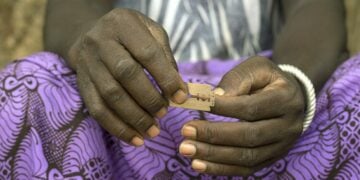eHealth Africa (eHA) has joined global health leaders, policymakers and partners at the International Conference on Primary Health Care (ICPHC 2025) in Addis Ababa, Ethiopia, to drive conversations on digital transformation, public health infrastructure sustainability, renewable energy for better healthcare delivery and health system resilience across Africa.
Themed “Advancing Primary Health Care in the 21st Century: Putting People First,” the event brought together thought leaders and innovators committed to strengthening primary health care and achieving Universal Health Coverage (UHC).
At the event, the executive director of eHealth Africa, Atef Fawaz, said the theme of this year’s ICPHC aligned with “our mission of building human-centered solutions to advance primary healthcare in underserved communities.
“At eHealth Africa, we believe technology and data should serve people. This is the rationale behind the interventions like the establishment of emergency operation centres, renewable energy for primary healthcare, climate resilient digital solutions and smart tools for vaccination campaigns, which were all presented to partners at the ICPHC,” he said.
Highlighting the importance of sustainability and local ownership, especially for the public health emergency operation centres across Africa, Kazeem Balogun, deputy director, Supply Chain Management said, “We must see Emergency Operation Centres not just as polio infrastructure, but as integrated public health command centers,” Kazeem noted this during the panel discussion to present findings from its Cross-Country Impact Study of Polio Outbreak Control Rooms (POCRs) ins-Saharan Africa.
He said, “Our goal is to build systems governments can sustain, not donor-driven facilities, but national assets embedded within primary health care structures.”
Sharing the overview of the establishment of Emergency Operation Centres that kicked off from Nigeria to over 24 African countries, Anthony Edozieuno, program manager for Public Health Emergency Management, said, “What began in Nigeria has evolved into a multi-country model that strengthens emergency coordination across Africa. This is a true testament to shared learning and partnership.”
The panel discussion, which was preceded by a roundtable, provided an opportunity for partners to share success stories and how the establishment of these Public Health Emergency Operation Centres has an impact on preparedness and response.
At the ICPHC, eHealth Africa hosted two roundtable sessions, sharing its human-centred digital solutions.
Temitayo Tella-Lah, Program Manager Climate Adaptation in Health, Food Security and Nutrition showcased eHealth Africa’s Climate Health Vulnerability Assessment Tool (CHAT); a digital platform helping governments, stakeholders and primary healthcare facilities to assess vulnerabilities to climate change. “CHAT helps decision-makers move from awareness to action,” Temitayo highlighted. “It enables countries to identify risks, design climate-resilient health interventions, and protect communities before crises occur.” Developed to strengthen evidence-based climate adaptation planning at the national and subnational level, CHAT represents a practical step toward integrating climate intelligence into health system decision-making and advancing climate-resilient primary healthcare delivery.
Similarly, Abubakar Shehu, program manager for Disease Prevention and Monitoring, showcased eHealth Africa’s PlanFeld solution, a digital microplanning solution transforming vaccination logistics. “With Planfeld, we’ve cut microplanning time from five days to just ten minutes,” Shehu explained. “It ensures equitable workload distribution, reduces missed settlements, and helps governments make faster, smarter vaccination decisions.”
Concluding eHealth Africa’s presentations at ICPHC 2025, Toju Ogele, project manager, called for renewable energy scale-up in primary health care facilities.





